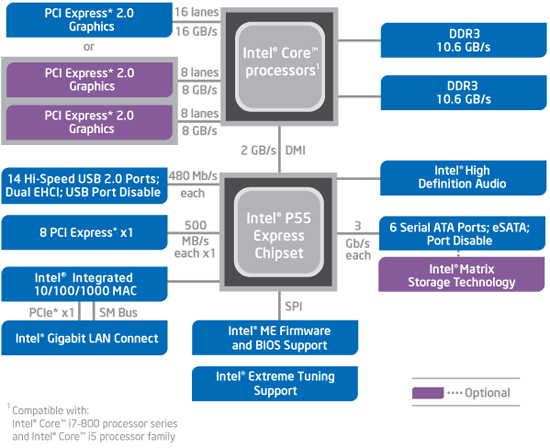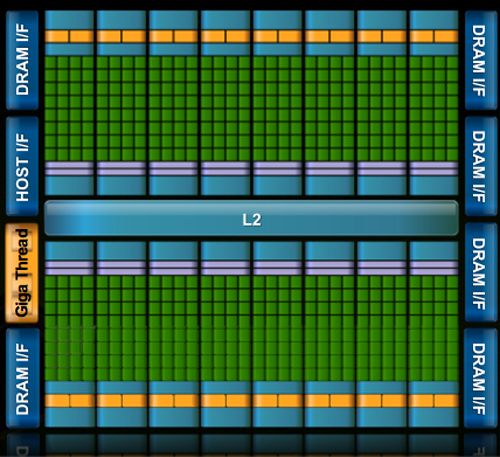The FTC Sues Intel Over CPU & GPU Competition
by Ryan Smith on December 16, 2009 12:00 AM EST- Posted in
- CPUs
Intel’s Response
Intel wasted no time in responding to the FTC’s suit. In their response, Intel has denied the accusations, and insisted that they have competed “fairly and lawfully,” noting that prices (ASPs) have been declining at a rate faster than any other industry.
Of particular note in Intel’s response is their claim that the FTC’s case “is based largely on claims that the FTC added at the last minute and has not investigated.” This we’re assuming means all of the GPU-related claims. You can read into this several ways, but our take is that Intel is more concerned with the GPU-related claims than the CPU-related claims at this moment.
Finally, Intel is understandably annoyed that this even reached the lawsuit stage. As we mentioned before Intel was already in settlement talks with the FTC, and believes that the issue should have been resolved there. In the failure of these talks, Intel has cited that the FTC “insisted on unprecedented remedies – including the restrictions on lawful price competition and enforcement of intellectual property rights set forth in the complaint.” As the FTC would not back down on their requested remedies and Intel would not accept them, this is what has lead to the case moving on to a lawsuit.
What the FTC Wants
So what does the FTC want? For one thing, not money. In their claims and requested remedies, they have not asked for any kind of fine, but rather are focusing exclusively on enforcing changes in the way Intel conducts business. This means their remedies are entirely corrective, rather than being a mix of corrective and punitive remedies such as what the EU has gone for.

What the FTC wants for Christmas: For Intel to license DMI
For their corrective remedies, here is what the FTC wants:
- For Intel to stop doing all of the things mentioned above.
- Intel cannot require OEMs to purchase only Intel CPUs and GPUs, purchase them in specific quantities, or to not purchase competitors GPUs and CPUs. This is effectively a stab at the rebates Intel has been offering for bulk purchasing, and the advertising help Intel has been offering to bulk purchasers.
- To stop prioritizing CPU shipments to loyal OEMs.
- To stop withholding technical support from disloyal OEMs.
- For Intel to be disallowed from producing/distributing any software or hardware that unreasonably excludes or inhibits the performance of competitors’ GPUs and CPUs.
- To stop selling things below cost. The FTC is defining this as being the average variable cost plus a “contribution to Intel’s fixed sunk costs in an appropriate multiple of that average variable cost.”
- For Intel to do a few different things about the versions of their compiler that put AMD at a disadvantage (which the FTC is calling the Defective Compiler): offer a substitute compiler to customers for free that is not a Defective Compiler, or to compensate customers in switching to another compiler, to provide notice to software buyers of products compiled using the Defective Compiler that they may need to replace their software.
- To stop Intel from making misleading statements.
- To prevent Intel from coercing benchmark organizations into adopting misleading benchmarks.
- For Intel to license the QPI and DMI buses to 3rd party chipset manufacturers.
- For Intel to not block the Global Foundries deal (AMD and Intel already settled this) or any similar deal that VIA might make.
- For Intel to stop badmouthing competing products unless they have solid scientific evidence.
- For Intel to foot the bill for the independent organization that will monitor this.
It’s a long list, but there’s nothing in it that’s particularly surprising. The FTC’s ultimate goal is to get Intel to stop engaging in all of the anti-competitive actions they have been engaging in for the last decade, and to have them directly monitored for an indefinite period of time in the future to make sure they do not resume these actions.
On an interesting note, the FTC chose an unusual way to go about this suit. Without getting into the nitty-gritty of anti-trust laws, the FTC has multiple sections of the FTC act to charge violators under. Normally when they engage in a lawsuit, they charge them under Section 2, which allows for harmed consumers to sue violators in private for triple damages. The FTC has decided that it’s in the best interest of everyone to not open Intel to that kind of liability or to take the risk that they’ll lose the suit based on that kind of liability, and instead charge them under Section 5. The big difference between the sections is that a Section 5 violation only leaves Intel open to the damages caused by their actions, and not to triple that price tag. Overall the use of Section 5 is very rare compared to Section 2, but the use of it is growing according to the FTC.
At this point we do not have any idea what the price tag would be on damages for Intel if they were to lose this suit, but it’s a reasonable expectation that it won’t be cheap, going into the billions of dollars. Triple damages would make that even higher. As triple damages were established as a punitive solution, this is consistent with the FTC’s position that they are not trying to enact a punitive remedy upon Intel.
Conclusion
So when does this battle royale kick-off? Not for a while, it seems. The case is currently scheduled to go before a judge on Wednesday, September 15th of 2010, which is 9 months from now. Even if it were to start on time (it likely won’t), a ruling would take an equally long time. It may be 2012 before the case is ruled on, later if the case starts late.
In the meantime, there are the positions of NVIDIA, Intel, and AMD to consider. Despite the FTC’s immediate concerns, with the recent cancelation of Larrabee Prime, Intel probably isn’t the risk to the GPU market that the FTC believes they are. The question will be what Intel will be announcing in 2010 as the successor to Larrabee Prime, and what actions they may be taking. It’s not in their best interests with this case to engage in anything that might be seen as disparaging of AMD or NVIDIA GPUs, which in turn may influence Intel’s actions here.
As for AMD, for them this entire matter is largely settled when it comes to CPUs. Their exposure on the GPU side is a bit more nebulous – they aren’t going to make integrated GPUs for Intel processors, so their exposure is in the smaller discrete GPU market. Without a better idea of what the FTC is accusing Intel of when it comes to discrete GPUs, it’s hard to say what the impact of this is. If this stops Intel’s anti-GPGPU efforts however, then it’s going to be good news for AMD’s efforts in that field.

Fermi: Intel's greatest fear?
And finally there’s NVIDIA. NVIDIA has been on a crash-course with Intel for some time now, and they would have it no other way. For NVIDIA this has been a very good month: first Larrabee Prime gets canceled, and now the FTC is going to fight Intel in court over several issues that effectively has the FTC fighting Intel on NVIDIA’s behalf. This could go a very long way in boosting NVIDIA’s GPGPU efforts with Fermi, not to mention the fact that the IGP chipset business has been quite good to NVIDIA lately and is something they would like to continue. This suit could come quite close to defanging Intel from NVIDIA’s perspective.
On a long-term perspective, we’re left wondering where this is going to leave the entire market when it comes to GPU/CPU integration. Both AMD and Intel have been pushing it, with Intel preparing CPUs with both on-chip and on-die GPUs. Could a successful FTC suit put a stop to this Fusion for Intel? Will this slow down or stop GPU/CPU integration for the entire market, and greatly benefit CPU-less NVIDIA in the process? The outcome of this case could very well have an impact greater than just stopping any anti-competitive actions Intel is engaging in, so it’s going to be something we’ll be keeping a very close eye on.










114 Comments
View All Comments
- Friday, December 18, 2009 - link
this whole Intel anti competitive drama was about the future of computing, not the past. At this moment they do not have / nor are they capable in such a short time, to offer anything better than AMD's concept of GPUCPU. Intel is not prepared, and has been blocking the future of computer processing for quite a while.asH
- Friday, December 18, 2009 - link
AMD was first to conceptualize Dual Core (huge) – Intel beat AMD in production, but AMD’s was better, until Intel went back to the drawing board. AMD was first to conceptualize GPUCPU, Intel again will be first to production in 2010asH
Scali - Friday, December 18, 2009 - link
AMD wasn't the first.The first 'regular' (as in not embedded/specialized hardware) CPU on the market to have two cores was the IBM POWER4, in 2001. The concept of multi-core itself is far older though, and certainly not 'conceptualized' by AMD.
Likewise, GPUCPU isn't new, various vendors (including nVidia) already have chips on the market with both a CPU and a GPU on board.
- Friday, December 18, 2009 - link
that's what took you so long?lol
asH
- Friday, December 18, 2009 - link
I was thinking Opteron
MengNa - Friday, December 18, 2009 - link
Being the first to conceptualize something means nothing unless you can actually deliver a good product at the right time...- Friday, December 18, 2009 - link
If I had a billion dollars I and you had $100, I could easily make your ideas mine, and better too. You could never profit from your ideas more than I.MengNa - Saturday, December 19, 2009 - link
Well that's how business works. For the most part.Scali - Friday, December 18, 2009 - link
All AMD has is a concept of GPUCPU.Intel isn't blocking the future of computer processing at all.
They have the most advanced multicore x86 architecture on the market, and I don't see anything from AMD that could get close, so there is nothing for Intel to block. Phenom II is way slower, and anything else is years off on the roadmap.
Intel is also trying to get into the GPGPU market. Doesn't sound like blocking to me. Clearly they see that GPGPU is going to play an important role in the future of computing, and they're making an effort to be part of it.
The only company who got GPGPU right so far is nVidia. AMD plays no role in GPGPU yet.
This whole drama is about AMD and its huge following of fanboys crying about the fact that they cannot compete with Intel and nVidia on a technical level, so they try to exploit the fact that they're the small and weak company. Being a large successful company is a crime these days.
- Friday, December 18, 2009 - link
grow upasH